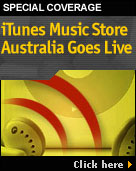Apple: Our biggest competitor is P2P

On the day Apple launched the Australian version of its iTunes music store, Cue said that people now have an alternative to illegally downloading music and he believes they are willing to pay a "fair price".
"Our view is that our biggest competitor is illegal music and P2P services. We always thought that if we offered a better alternative then those customers would be happy to pay. Obviously ... we will never be better than free ... but we think AU$1.69 is a very competitive and fair price to pay," said Cue.
Apple will sell singles at AU$1.69 per track and albums will cost around AU$16.99. Music videos are also available for download at AU$3.39 each.
Cue claimed that none of the other 20 countries where Apple has launched its online music store have previously had a strong legal music downloading market.
"We have now sold over 600 million songs worldwide and have nearly 80 percent market share in most of the countries we are in.... This is our 21st time and I will say that there is no place that we have ever launched where music downloads have been strong prior to us," said Cue.
Cue believes that the next generation of music buyers will not know music as anything other than "digital bandwidth".
"It is certainly our belief that digital music buying is the future of music purchasing. Certainly our customers love it and you can see it in the younger generation. They buy a lot of music now and they buy it all online. That is what they know music as, they certainly do not know music as a record or as a CD, they know it as digital bandwidth," said Cue.
According to Cue, it was important that the Australian iTunes music store was built for and by Australians because the domestic music industry is so strong.
"A little bit over 30 percent of the music that gets sold in Australia is local music. We have hired a team of folks in Sydney, Australia to work with the labels and program the front page. This is really built for and by Australians," said Cue.
Having had some experience in launching the store in 20 other countries, Cue said the Australian version was the "biggest ever".
"We have quite a few independent labels already signed up. This is the biggest launch of the music store we have ever done," said Cue.
The one major music label missing from Apple's iTunes Australia launch is Sony BMG. Although Cue would not discuss the reasons why Sony had not signed up, he explained that setting up such a store is not easy: "We are working with Sony and we know their artists would like to be a part of the launch and we hope they will join us".
"The big factor in getting to market is negotiating with the labels, getting all the things in place getting all the content from that standpoint. It is a lot harder than it looks ... people think it is very easy for us to expand but it is a lot of work," said Cue.
Apple has also signed an exclusive agreement with Coles Myer to sell its iTunes Music Cards, which are gift vouchers that can be purchased from retail outlets and redeemed online.
A spokesperson for Coles Myer said the deal with Apple means the cards will only be available from Coles Myer outlets, which include Megamart, Coles, Bi-Lo, and Kmart, until February 28 2006: "After that date the cards will become more widely available at other retailers. We will obviously continue to sell them but it wouldn't be under and exclusive arrangement."
